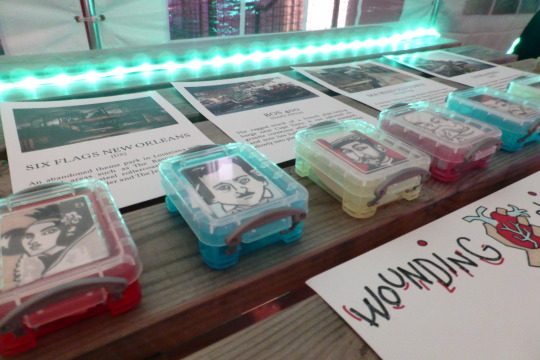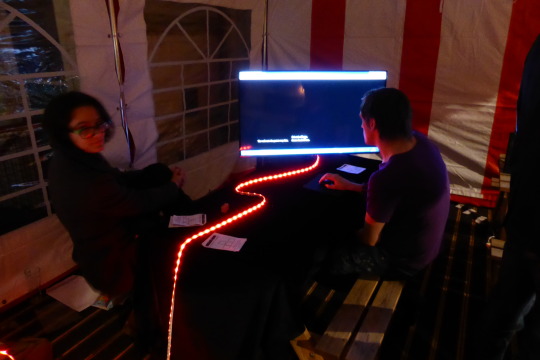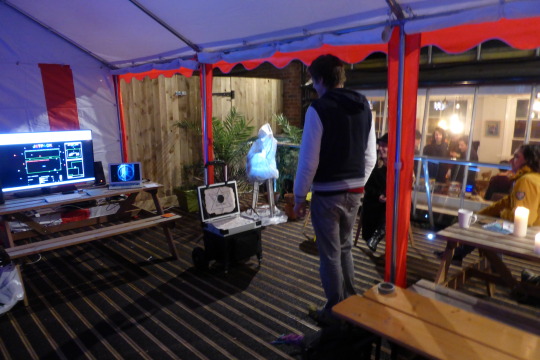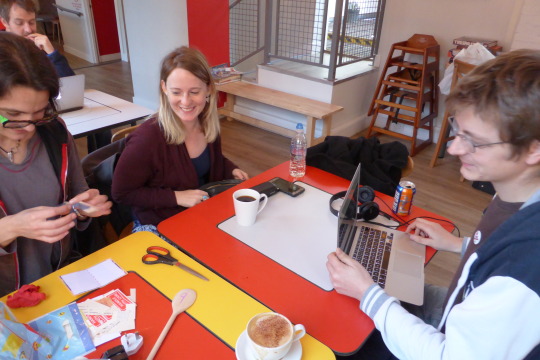
I made ‘Wounding Blisses’, an interactive poem/analogue fighting game, for CONTROL ROOM, an event I co-organised with Abigail Parry for the GameCity festival in Nottingham.
Before I expand on that short paragraph, a little personal history: between the ages of 12 and 15 (estimated) I wrote and drew detailed plans for a number of different games in the style of Street Fighter II, Mortal Kombat, One Must Fall, Body Blows and so on, some of which I fully intended to send on to game developers. Content-wise, my efforts were diligently derivative – to the point where the female characters flashed their underwear while performing special moves and one outline bore the title ‘Fatal Klash’ – but I was remarkably prescient in one respect: I proposed that these games utilise the same technology as 3D cinema and television, so that the fighters seemed to project out of the TV screen.
I only mention this by way of noting that ‘Wounding Blisses’ is a sort of return to the genre after a 17-year break.
The subtitle to the CONTROL ROOM event was ‘Poetry Micro Arcade’, the broad concept being that festival attendees would ‘play’ the poems individually, like they might an arcade machine, and we’d have ’em queueing all round the block to figuratively plug their change into the slots. There were four interactive pieces in total, each manned by a different poet. Abby debuted the beta version of her digital riddle-poem ’Room Escape’. Made using the Twine engine, it’s a cross between a Muldoonian textual maze and a Myst-style puzzle box. There’s a particularly clever sequence where the player must turn the ‘lights’ in the game on and off, inverting both the text and the page/screen in order to progressively reveal more words, in a way that’s reminiscent of how the visual echo of a light filament gives the impression of floating symbols in a dark room.

Harry Man came up with ‘Jetpack’, an input-generated poem based on the 1983 game of the same name. Players re-arrange a kind of countdown sequence in order to create their poem and are then entered into a high score table.
Abi Palmer revived ‘The Alchemist’, a piece which supplements a player-chosen elemental poem with contrasting sensory stimulus – like the smoke from a blown-out match, or water being poured over the knuckles and wrists.

Then there was ‘Wounding Blisses’. The title is from a line in the Earl of Rochester’s ‘My Dear Mistress has a Heart’. Players pick from a roster of historical/mythical characters who came to ruin through affairs of the heart, including General Revanche (Georges Ernest Boulanger) and Phaedra. An opponent is then picked, followed by a stage (one of five abandoned, wrecked or desolate places from around the world), before the player and the game-master (me) take turns reading lines to each other that describe the course of the battle, in any order. The concluding lines are then picked from a random red or purple envelope.
In short, it’s designed (a) so that there are hundreds of possible variations of the poem, (b) so that the performance is an exchange, with both participants reading aloud, and © to mimic the structure of rounds in a physical dust-up, but with a surprise ending.
I came away from CONTROL ROOM feeling all evangelical about the potency of interactive performance poetry as compared to the usual stand-up-and-talk poetry reading. Because it involved so much repetition on my part, the words gained a kind of weight as the evening wore on – that is, the poem began to feel more real, more physical, even though it was constantly changing. And whereas I’ve always struggled, when reading from a stage, to get a lock on what the audience is thinking, it’s very easy in a one-to-one performance to make that connection, and therefore to hold someone’s attention.
I also really enjoyed it.
Feedback was largely positive, with several people coming over to my table saying, “I’ve been told I’ve got to play this.” This was a non-poetry audience who were being invited to listen to and recite heroic couplets, senryū, unrhymed tercets and other units of verse – there was no guarantee they would be particularly receptive to it. Younger players seemed the most unconvinced, partly because the twist ending to the poem is always that no one wins. I guess that’s what ultimately makes it a poem apeing a game more than a game with poetic elements.
More of this, I think, and about a decade after it catches on someone might even get a Ted Hughes Award for it.
